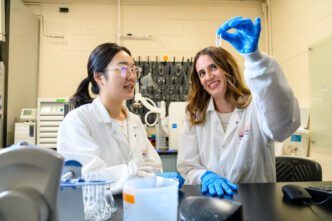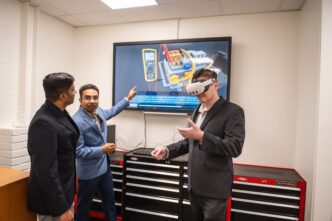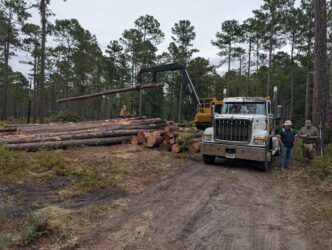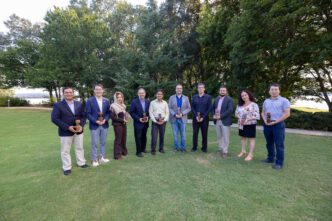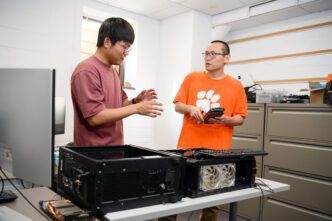April Gillens knew while growing up in Eutawville, South Carolina that she wanted to make a contribution to African-American history, but she didn’t know how or where she would find the opportunity.
It turns out the opportunity found her at Clemson University.

Gillens will forever be the first African American to receive a Ph.D. in environmental engineering and Earth sciences from Clemson. It wasn’t a distinction she sought when she enrolled, and it wasn’t easy, but Gillens achieved her dream and blazed a trail that many saw as long overdue.
“This,” she remembers thinking,”is my contribution to history.”
Eight years after receiving her doctorate from Clemson, Gillens continues to leave her mark on STEM fields as federal program manager for stable isotopes in the U.S. Department of Energy Isotope Program. Her work supports a wide range of research not only in the United States but around the world.
Gillens’ journey shows the educational and career path of one trailblazing alumna while also underscoring the enduring legacy of bonds formed in the Clemson Family.
Now living in Washington, D.C., Gillens has stayed in touch with Clemson through Serita Acker, the executive director of PEER & WISE. While a student, Gillens confided in Acker at a time when peers and mentors who looked like her were in short supply.
“I had some challenges in my graduate program, and I made her aware of those challenges and talked through navigating my career plan,” Gillens said. “She helped me understand that I was in a unique position and some of the challenges I was experiencing were growing pains.”
Acker said the career Gillens has built underscores that nothing is impossible.
“She is showing other women that they can do it, and she is showing people of color that they can do it.” Acker said. “She is someone that stands out as a great role model, when you think about her career where she is now. Even though she may have had some times that have been difficult, she stayed the course and she didn’t give up– and that’s what I’m most proud about.”

Myrtede Alfred remembers she had just begun pursuing her master’s degree in industrial engineering in 2012 when Gillens introduced herself at a Society of Women Engineers meeting and invited her to join the Black Graduate Student Association. As they became close friends, Alfred learned that Gillens was an excellent cook, her shrimp and grits especially memorable.
Gillens’ apartment across from Bowman Field became the hangout spot, and Alfred recalls dropping by often, at times just to take a nap.
“April has a goal– she knows what she wants,” said Alfred, now an assistant professor of industrial engineering at the University of Toronto. “Even in grad school, she said, I am going to get a AAAS fellowship, I am going to D.C. and I am going to work on policy– and that’s what she has been doing.”
Gillens comes from a tight-knit, small-town family with strong education and Clemson roots. Her sister, Courtney, was valedictorian at Holly Hill-Roberts High School, just two years before April earned that same honor at the same school, by then renamed Lake Marion High School.
Their uncle, Harold Gillens, holds a Bachelor of Science in electrical engineering from Clemson and remains strongly connected to his alma mater, including as a member of the Thomas Green Clemson Academy of Engineers and Scientists.
He said that when he learned his niece was on track to become the first African American to receive a Ph.D. in environmental engineering and Earth sciences from Clemson, he was proud and elated but not surprised.
“It’s just the thing I would expect, having seen her in challenging situations,” he said. “I would check on her when I visited campus, and she was always busy and focused.”
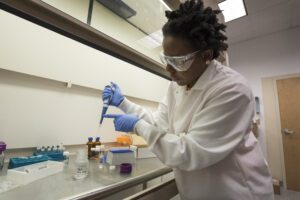
After Clemson, April Gillens headed to the Washington, D.C. area to begin her career, following in the footsteps of her uncle, who also had an accomplished career in the federal government before entering the private sector.
She started as a National Nuclear Security Administration Graduate Fellow with the U.S. Department of Energy. She later worked in the U.S. Department of Defense as an American Association for the Advancement of Science – Science and Technology Policy Fellow.
From there, she accepted a position in the Science, Technology Assessment, and Analytics Team at the Government Accountability Office.
Now, in her work with the Energy Department’s Isotope Program, Gillens manages the supply and production of stable isotopes, oversees research and development for enriching the isotopes at labs and universities and handles the production and approval of plans for making stable isotopes.
“What I like best is that the work that we do has a very real impact,” Gillens said. “We are a mission-essential function in the Department of Energy. It is critical that we maintain our infrastructure to provide radioactive and stable isotopes.”
Gillens said that if she had any advice for future generations it would be to accept challenges and to not give up.
“Take any challenge that you encounter and look at it from a positive perspective and assess how this challenge can propel you,” she said. “See yourself on the other side of it, if at all possible, and with that imagination eventually you will get on the other side of the challenge.”


